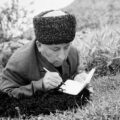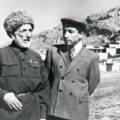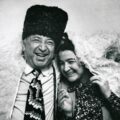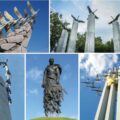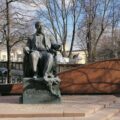- © rasulgamzatov.ru
- Расул Гамзатов с отцом Гамзатом Цадасой/Rasul Gamzatov with his father Gamzat Tsadasa © rasulgamzatov.ru
- Расул и Патимат Гамзатовы/Rasul and Patimat Gamzatov © rasulgamzatov.ru
Rasul Gamzatov is a remarkable phenomenon, even for Russian/Soviet poetry with its fair share of geniuses. He wrote in the Avar language but gained nationwide fame. He sat on the Presidium of the Supreme Soviet of the USSR but was truly a people’s poet. Most importantly, his poems are passed down from generation to generation like a national treasure.
Poetry in the genes
Rasul Gamzatov was born in 1923 in the Dagestani mountain village of Tsada, in the family of the poet and translator Gamzat Tsadasa. Gamzat wrote poems and fables, and translated Pushkin’s works into the Avar language, so Rasul was introduced to literary pursuits at a young age. He recalled how his father made him read Tolstoy’s “Hadji Murat” to the neighbors and immediately translated it into the Avar language. No wonder the boy wrote his first poem at the age of 9. When Rasul was in the 7th grade, his poems were published in the newspaper “The Bolshevik of the Mountains.” The young poet signed his poems in local newspapers the same way his father did — Tsadasa. One day, an elderly man who knew Rasul’s family but did not know that the boy wrote poems said to him, “Listen, what happened to your venerable father? I used to be able to memorize his poems after reading them just once, but now I can’t even understand them!” From then on, Rasul used his father’s first name and signed his works Rasul Gamzatov.
In 1939, the poet graduated from a teaching school and taught at a school for two years. Later, he worked as an assistant director at a theater, and a journalist in newspapers and on the radio. In 1943, Gamzatov’s first collection of poems, “Fiery Love and Burning Hate,” was published. In 1945, with several publications under his belt and a membership in the Union of Soviet Writers, Rasul Gamzatov came to Moscow to apply to the Literary Institute. “To be honest, I was not keen on entering the Institute, I just wanted to see Moscow and go home,” he recalled. “Even though the Director of the Institute, Fyodor Gladkov, could tell that my Russian was poor, and my dictation was so peppered with pencil corrections that it seemed like sparrows had been fighting on it, he added my name to the admission list. I was always grateful for it.” Gamzatov said that the Literary Institute taught him “to hold the pen in his hand and cherish the sacred feeling of self-dissatisfaction.” Five years of study introduced Gamzatov not only to great classics but also to talented contemporaries. At the Institute, Rasul became friends with young poets Naum Grebnev and Yakov Kozlovsky, who later translated his poems into Russian. Gamzatov’s first Russian-language collection, “My Land,” came out in 1948. The fact that many of his poems became known to the public through translations gave critics reason to claim that Gamzatov was a product of the translators, especially since the Avar language does not have rhymes. Yakov Kozlovsky disagreed. “What makes Gamzatov’s poetry special is that no matter what he writes about, the spirit of Dagestan is always present. Translators can’t invent it.”
Mountains and Stars
Paradoxically, while Gamzatov’s poetry is rooted in Dagestani culture, it strikes a chord with anyone who has a heart. To love his verses, one does not need to understand poetry: every line of his is simple and perfect like an arrow and reaches the reader’s heart. One cannot help but feel for the boy whom the older dzhigits did not take along and who feels like a “resentful eaglet forced to sit in the nest until evening.” One cannot help but feel the sadness of the elderly man who rests his gray head on his mother’s lap, full of remorse that he “caused so much grief to his family” when he was a kid. The mother is one of the central images in Gamzatov’s poetry, up there with Dagestan. As critics noted, the poet made the mountains of Dagestan so high that the whole world could see them. And not only the mountains, but also the people whose songs are “like an eagle’s unhurried flight, and whose dances make one think of a horseman whose horse is galloping, oblivious to the reins.”
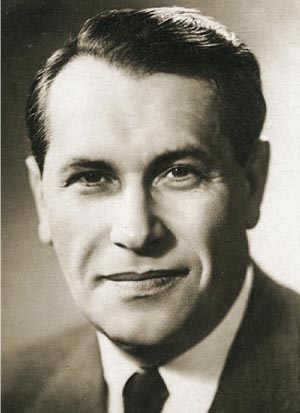 Verses kindled by love for family and friends often acquired a universal dimension. The most vivid example is the poem “Cranes.” Gamzatov wrote it in the Avar language, inspired by his trip to Japan where he heard the story of a Japanese girl named Sadako Sasaki who had suffered the effects of the bombing of Hiroshima and made paper cranes in an attempt to heal herself. While Gamzatov was in Japan, he learned about his mother’s death. On his way home, the poet reflected on the Japanese girl, his mother, his older brothers Magomed and Akhilchi who had not come back from the Great Patriotic War, and all those people who had lost their lives too early. That’s why the cranes in his poem are Avar, Russian, and Japanese.
Verses kindled by love for family and friends often acquired a universal dimension. The most vivid example is the poem “Cranes.” Gamzatov wrote it in the Avar language, inspired by his trip to Japan where he heard the story of a Japanese girl named Sadako Sasaki who had suffered the effects of the bombing of Hiroshima and made paper cranes in an attempt to heal herself. While Gamzatov was in Japan, he learned about his mother’s death. On his way home, the poet reflected on the Japanese girl, his mother, his older brothers Magomed and Akhilchi who had not come back from the Great Patriotic War, and all those people who had lost their lives too early. That’s why the cranes in his poem are Avar, Russian, and Japanese.
Naum Grebnev translated the Avar word for “young men” as dzhigits. His translation was published in the literary magazine “Novy Mir” and caught the eye of the popular singer Mark Bernes. Bernes immediately knew that it should be a song, but dzhigits should be replaced with soldiers. Gamzatov did not object, since this word “would give the song a wider appeal and a universal touch.” In 1969, “The Cranes” was first performed before war veterans at a meeting in the editorial office of the newspaper “Komsomolskaya Pravda.” Marshal Ivan Konev and other prominent commanders were present. Long after the song ended, the audience remained silent. Then Konev gave Bernes a hug and said, his eyes welling with tears, “Thank you! It’s a shame we aren’t allowed to cry.” Today, “Cranes” rings a bell with anyone who speaks Russian, and a flock of cranes became a symbol of remembrance of those who died in the Great Patriotic War. The flying cranes motif can be found on monuments to fallen soldiers from Rostov to Krasnoyarsk.
- Мотив летящих журавлей можно видеть на памятниках погибшим воинам от Ростова до Красноярска/The flying cranes motif can be found on monuments to fallen soldiers from Rostov to Krasnoyarsk
A man with a big heart
Starting from the 1960s, Gamzatov’s poetry enjoyed overwhelming popularity. Writer and translator Shapi Kaziev, the author of the poet’s biography, recalled, “When I was a student of the Russian State Institute of Cinematography, I decided to go home to Dagestan for a holiday break. I asked friends what to bring. I thought they would ask for caviar or cognac. The unanimous answer was: a book of Gamzatov’s poems. His books were hard to get even in his homeland.” A wave of popularity brought the poet to the very top — to the Presidium of the Supreme Soviet of the USSR. Rasul Gamzatov took advantage of his position to help Dagestan. It was his reputation that helped rebuild Makhachkala and other cities of Dagestan as quickly as possible after the earthquake of 1970. Gamzatov plunged headlong into problems. His daughter Salikhat recalled how on a visit to an Avar village in Georgia the poet had spotted an unfinished building and asked what it was. It turned out to be the foundation of a school that had never been finished. “Dad left, and two days later, builders arrived, got down to work and did not leave until the school was finished,” said Salikhat. People flocked to Gamzatov’s office at the Union of Writers of the Republic of Dagestan, and he did his best to help. His assistant Magomed Akhmedov wrote numerous letters on his behalf, with requests from Dagestani poets and writers. Each time, Rasul would instruct him, “Make them cry and help.”
- Памятник Расулу Гамзатову в Москве/Monument to Rasul Gamzatov in Moscow © shutterstock.com, Aleksei Golovano
Rasul Gamzatov was revered not only for his poetry but also for his wisdom and humor — no wonder many of his jokes turned into aphorisms. At a meeting of the Writers’ Union in the midst of the anti-alcohol campaign, Gamzatov said, “We’ll have to bring it in ourselves.” At an evening with the poet, someone asked, “How did you climb so high?”. “Oh no, I was born in the mountains, I had to descend,” Gamzatov retorted. He jokingly referred to himself in his poems as “patimatik” or “doctor of patimatic sciences,” because the most important person in his life, his muse, friend, and assistant was his wife Patimat. The poet joked that he didn’t have to meet his future bride: Patimat’s parents lived next door and often paid him to look after the baby girl. “When she grew up, I was eager to do it for free,” Gamzatov confessed. “I learned to walk to come to you. I learned to speak to talk with you. I came to love flowers to give them to you. I fell in love with you to love life,” he wrote. Their happy marriage lasted over fifty years; his wife’s death was a huge blow to the poet. Gamzatov outlived Patimat by three years and was buried next to her in the old cemetery in the mountain village of Tarki. According to his last will, there is no patronymic, last name, or dates on the gravestone. Only one word — Rasul, in Russian. Apparently, Gamzatov believed that he said all he had to say in his books. “I wanted to tell adults and children, all schoolchildren: may our names, our songs, our honor, our valor and courage not go with us to the grave and turn into nothing, but set an example for future generations. May good people remain good, and may bad people become good.”
Tatiana Borisova

